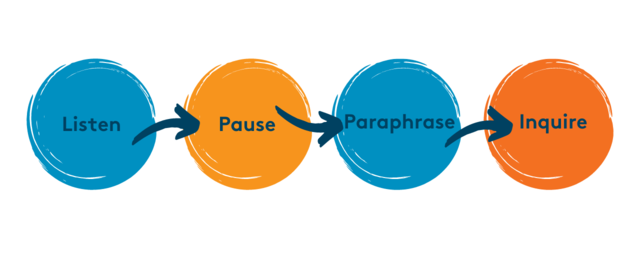The micro-skills of effective dialogue
By Deirdre McCracken on December 6, 2021 in Leadership
When working with school leaders and teachers to improve their coaching skills, we find there are usually a few big ‘aha’ moments.
These moments often happen when we work on identifying the micro-skills involved in actively listening and asking questions in ways that don’t make people feel like they are being interrogated.
These micro-skills consist of:
Listening:
clarify your intention
suspend judgement
attend fully
pause-reflect
paraphrase.
Inquiry:
presume positive intent
develop and use the language of inquiry
test assumptions
explore different perspectives and implications.
The pattern of inquiry looks like this:

Many educators want to develop the pattern of inquiry and the micro-skills that underpin it, and for good reason. Educators often tell themselves that they are good listeners and effective inquirers who are particularly good at hearing what others are saying and eliciting more information from them. But how good are they really?
To develop your coaching capability is a real craft. In ‘Learning Talk’, Joan Dalton shares insights into the skills we should be aware of and practice.
Firstly, it is important to keep the purpose of any coaching conversation in mind, and revisit at the beginning. When you keep the purpose in mind, you are sharper in how you process information. This improves how you paraphrase to check your own understanding. You are more likely to set aside any of the four unproductive listening patterns you might often fall victim to that inhibit our ability to listen to understand:
Judgemental listening – non-verbal and verbal judgments are easily picked up and get in the way by closing the conversation down rather than opening it up.
Autobiographical listening – thinking about our own ‘war stories’ with the idea that we might show empathy actually wastes time.
Inquisitive listening – asking lots of questions about things that are not being shared, takes the focus away from the speaker and what is important to them.
Solution listening – advice-giving takes the responsibility away from the other person, without considering and exploring the ideas that person might already have.
Unproductive listening patterns are a problem because they mean that we’re actually having an internal conversation with ourselves, rather than actively listening to the other person.
“Seek to understand; then to be understood.” Stephen Covey 1989
Interpreting and matching communication cues is also a useful skill to develop. As a coach watch out for physical cues such as changes to body language, tone, pitch, volume, and rate of speech. A word of warning – don’t decide what these changes mean! Instead, use your inquiry skills to ask questions so you can listen to understand.
“When we listen with less judgement, we always develop better relationships with each other. It’s not differences that divide us. It’s judgements about each other that do. Curiosity and good listening bring us back together” Margaret Wheatley 2002.
Secondly, words can have layers of meaning. We interpret and make our own meaning from them, based on our logic. If you want to have an impact as a coach, it’s important to be aware of the language you are using. Shift your questions from closed to open by using less ’do you…’, ‘can you…’,’have you…’ and more ‘what might…’, ‘how could…’, ‘tell me how…’. Use plurals, rather than singular words – ways, ideas, suggestions are more powerful than their singular examples. Why? Because it shows that there is more than one possible option. As a coach, you aren’t presuming that you’ve got all the answers.
You’ve got to presume the intentions of others are positive while you are coaching them. If you hold thoughts that the person, you're coaching that could be negative, they'll slip out in ways you don't expect. Presuming positive intent helps you to build trust.
Lastly, it is important to surface the beliefs teachers hold and invite them to test these. In other words, put your thinking on the table as one contribution to the collective thinking. As a coach you need to be able to do this well in balance with positioning ourselves as an effective listener and inquirer. Invite the person you’re coaching to do the same.
Effective coaching requires active listening to identify the teacher’s needs, surfacing deeply held beliefs and then building capacity based on the strengths of teachers. By positioning themselves as a learner and inquirer, coaches can better support and engage teachers in their important work, teaching and learning.
“The need to pay conscious attention to language and to building your own and others’ conversational capabilities cannot be over-emphasized because: if you can’t have the conversations, nothing changes.” David Anderson 2010
If you wish to learn more about how to develop a highly effective learning conversations and coaching in your own context, we have variety of workshops on offer next year. We can work with you directly in bespoke ways personalised for your Kāhui Ako, kura or school.
References
Covey, Stephen R. (1989). The 7 Habits of Highly Effective People. Simon and Schuster - New York.
Dalton, J. (2011). Learning Talk: build capabilities. Hands On Educational Consultancy PTY Ltd.
Dalton, J. (2013). Learning Talk: develop the art of inquiry. Hands On Educational Consultancy PTY Ltd.
Wheatley, Margaret J. (2002) Turning to One Another: Simple Conversations to Restore Hope to the Future NCs_PS_Toolkit_DPL_Set_B_WillingDisturbed.pdf (uchicago.edu)
If you have any questions about this article
Other articles you might like
Educational leaders are well aware of the importance of enabling teachers to take charge of their own learning in their professional settings.
Professional growth cycles (PGC) create an opportunity for leaders to review how teacher professional growth is promoted. Open conversations about what staff value when considering professional growth, and what further support might be appreciated to further develop their practice, are required. Such conversations can ensure PGCs are planned and created ‘with’, rather than ‘done to’ teachers.
How ‘open to learning’ are you?
